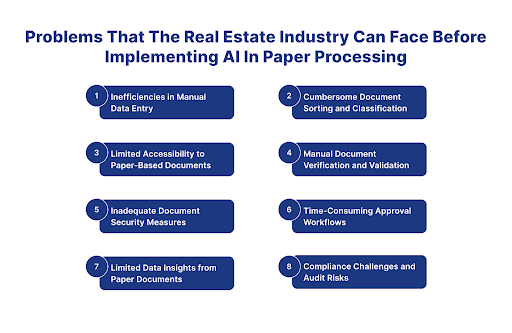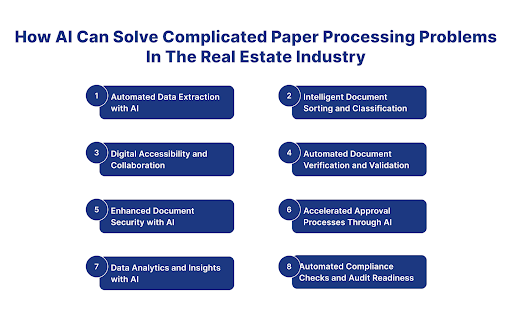8 Ways How AI Can Solve Complicated Paper Processing Problems In The Real Estate Industry
Posted by Hitul Mistry
/05 Jan 23
Tagged under: #ai,#aiinrealestate,#aiinpaperprocessing
just like every other technology, artificial intelligence has its shortcomings. This blog will examine situations where AI can fail in the real estate industry.
Introduction

- Many sectors are struggling with the problems brought on by large paper-based operations in this era of digital change. Paper processing issues are one area where the burden of manual paperwork has been especially felt by one industry. However, the incorporation of artificial intelligence (AI) has come to light as a game-changer, with the potential to completely transform how businesses handle and analyze enormous volumes of documentation. This blog will examine How AI Can Solve Complicated Paper Processing Problems In The Real Estate Industry.
Problems That the real estate industry can face before implementing AI in paper processing

1.Inefficiencies in Manual Data Entry
- Manual data input was frequently used in traditional paper-based operations, which are laborious and prone to mistakes. Workers had to enter data from paper documents into digital systems, which resulted in errors, inefficiencies, and higher operating expenses.
2.Cumbersome Document Sorting and Classification
- A significant problem in paper-intensive operations was the manual categorization and sorting of records. Organizations found it challenging to classify documents, which caused processing times to lag and perhaps resulted in the loss of essential data.
3.Limited Accessibility to Paper-Based Documents
- Accessibility is naturally limited by paper documents, mainly when working remotely or in collaborative settings. Decision-making procedures were slowed by the need for a manual search to obtain information from physical files.
4.Manual Document Verification and Validation
- Manual paper-based documentation methods sometimes impeded validation and verification procedures. Information authenticity and accuracy were difficult for organizations to ensure, raising security and compliance risks.
5.Inadequate Document Security Measures
- It was frequently difficult to guarantee the protection of sensitive data using traditional paper techniques. Paper records were vulnerable to physical loss, theft, or unauthorized access, putting businesses at risk for compliance problems and data breaches.
6.Time-Consuming Approval Workflows
- Paper-based approval processes required the actual transfer of papers between stakeholders for signatures and scrutiny, which was time-consuming. This manual procedure frequently pushed back timelines for projects and decision-making.
7.Limited Data Insights from Paper Documents
- Obtaining valuable insights from paper documents was a difficult undertaking in conventional workflows. Finding patterns, trends, or useful information in a pile of documents required much effort and was frequently not feasible
8.Compliance Challenges and Audit Risks
- In paper-centric workplaces, meeting regulatory compliance standards and being ready for audits were difficult. One enduring problem was making sure that documentation complied with all applicable regulations.
How AI Can Solve Complicated Paper Processing Problems In The Real Estate Industry

1.Automated Data Extraction with AI
- AI's introduction into paper processing has ushered in a new, efficient era. AI algorithms-driven advanced optical character recognition (OCR) technology automates data extraction from paper documents. This ensures correct and trustworthy data is effortlessly incorporated into digital systems while speeding up the data input process and lowering the chance of mistakes. By this way AI can solve complicated paper processing problems in the real estate industry.
2.Intelligent Document Sorting and Classification
- AI makes document management more intelligent by automating the sorting and classifying procedure. Machine learning algorithms examine their content and look for patterns and context to classify texts correctly. This guarantees that papers are arranged effectively, optimizing workflows and enabling prompt retrieval of pertinent data. By this way AI can solve complicated paper processing problems in the real estate industry.
3.Digital Accessibility and Collaboration
- AI-powered document processing enables smooth digitalization and convenient information access from any location. Organizations can guarantee expedient access to processed documents to pertinent stakeholders by utilizing cloud-based solutions and digital repositories. This fosters better teamwork and encourages the transition to more adaptable and remote-friendly work settings. By this way AI can solve complicated paper processing problems in the real estate industry.
4.Automated Document Verification and Validation
- AI brings about automation of the validation and verification procedures. More sophisticated algorithms can more accurately cross-reference data, identify abnormalities, and confirm the legitimacy of documents. This automated method reduces the possibility of mistakes related to manual validation while also improving the verification process's dependability. By this way, AI can solve complicated paper processing problems in the real estate industry.
5.Enhanced Document Security with AI
- The use of AI in document processing introduces strong security controls. Digital processes effortlessly include authentication methods, access restrictions, and encryption. In addition to detecting odd trends or illegal access attempts, AI algorithms may also guarantee that sensitive data is safe throughout the processing lifespan by setting off alarms. by this way AI can solve complicated paper processing problems in the real estate industry.
6.Accelerated Approval Processes Through AI
- AI streamlines workflows for approval through process automation. AI-driven decision support systems, workflow automation, and electronic signatures considerably accelerate approval procedures. This increases overall operating efficiency and shortens the time needed for approvals. By this way AI can solve complicated paper processing problems in the real estate industry.
7.Data Analytics and Insights with AI
- The power of data within papers is unlocked by AI-driven analytics. Algorithms for machine learning and natural language processing (NLP) help businesses uncover patterns, derive insights, and make data-driven choices. By improving the strategic value of the data in documents, this transformation helps people make well-informed decisions. by this way AI can solve complicated paper processing problems in the real estate industry.
8.Automated Compliance Checks and Audit Readiness
- AI makes automatic compliance checks possible, guaranteeing that papers meet legal requirements. Organizations may proactively manage compliance problems by automatically identifying possible issues and monitoring compliance requirements continually. In addition to lowering the possibility of audit failures, this improves overall regulatory readiness. By this way, AI can solve complicated paper processing problems in the real estate industry.
Conclusion
- AI's incorporation into paper processing is a revolutionary step towards a more productive, accurate, and reachable future. Artificial Intelligence (AI) has become a vital tool for businesses to optimize their operations by solving problems with human data input, document sorting, accessibility, and verification procedures. Artificial intelligence (AI) applications in paper processing are poised to enable enterprises to achieve unprecedented levels of productivity and efficiency as we transition from conventional paper-based processes to a technologically sophisticated environment.
How Digiqt will help you to implement AI in your company
-
At Digiqt, we are dedicated to assisting companies in automating critical processes. Our highly skilled and professional team ensures the timely development and delivery of AI software. We commence by thoroughly understanding our client's specific requirements, and based on these requirements, our proficient team develops the AI software. Furthermore, we provide our clients with monthly updates on the software development progress.
-
Digiqt's commitment to automation, client-centric software development, and regular updates ensures efficiency and effectiveness in streamlining insurance operations.
Contact Us
About Us
We are a trusted, quality driven and value-driven digital product development company delivering services in BFSI sector.
Digiqt Technolabs is a passion turned into a company. We are a trusted product development company that specializes in turning your ideas into digital solutions utilizing our years of experience in industry-leading technologies.
We deliver high-tech innovations and great solutions for our clients in the most efficient manner regardless of the project complexity.
We are trusted, quality-driven and value-driven product development company.

Our key clients
Companies we are associated with
Our Offices

Ahmedabad
706,31FIVE Building,opp.Palladium, Corporate Rd, Makarba, Ahmedabad, Gujarat.
+91 99747 29554

Mumbai
WeWork, Enam Sambhav C-20, G Block,Bandra- Kurla Complex, MUMBAI-400051, Maharashtra.
+91 99747 29554

Stockholm
Bäverbäcksgränd 10 12462 Bandhagen, Stockholm, Sweden.
+46 72789 9039












